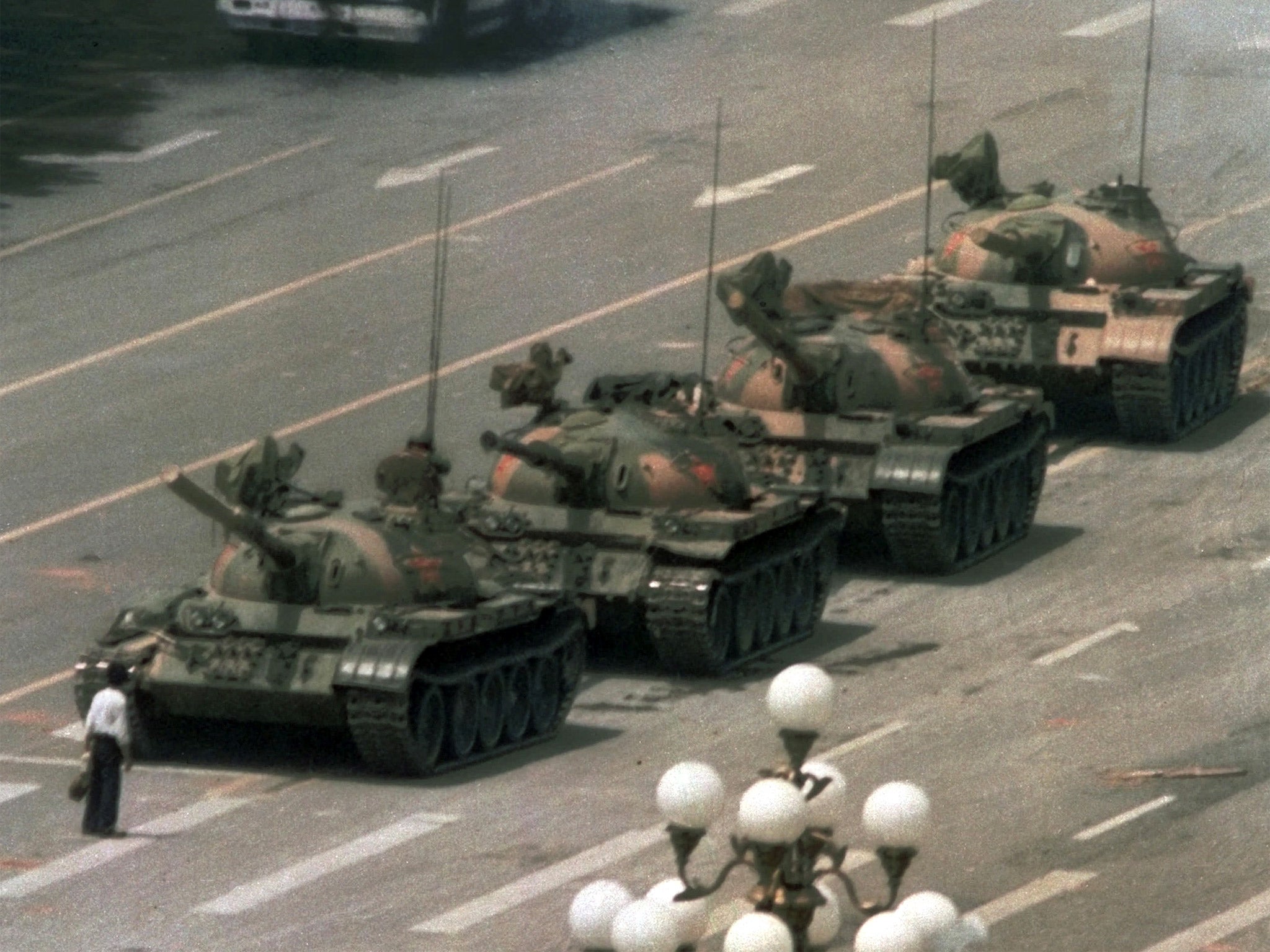China’s censorship of Tiananmen Square isn’t oppression – it’s just a new kind of extreme counselling
This demand to forget fosters a whole new way of thinking


The Chinese government must be very emotional about the thousands of protesters they killed 25 years ago. Because normally, on an anniversary of an event like that, a minute’s silence is arranged. But the Chinese Communist Party has ordered a silence to last forever, with anyone who even talks about it publicly put in jail, how about that for a truly moving mark of respect?
One implication of this policy is that Crimewatch in China must be the opposite of the programme in Britain. Their Kirsty Young must say “Did you witness the gunning down of terrified demonstrators in Tiananmen Square? Then call us now and inform us you can’t remember a thing about it. Even if you only have information you think is trivial, we still want you to forget it, as it may be vital to us ensuring no one knows anything whatsoever about what happened.”
In history lessons, teachers must ask for an essay on the events of June 1989, adding “You’ll get extra marks for missing as much detail as you can, with an A if you can hand in a completely blank sheet of paper.”
The graves of those killed have been guarded recently by plain clothes police to prevent even the tiniest commemoration of the protests, and at least 50 people were arrested in advance, as it was believed that they may have wished to raise the issue in some way, all of which are signs of a healthy thriving society at ease with itself.
Given the Chinese government’s record, the most surprising thing is that Tony Blair hasn’t been revealed as its advisor. We’ll know it’s happened when the President says “Look, I know some people disagree with the shooting, but it’s important now to draw a line under the issue and move on.”
To be fair, the reason they arrest anyone who discusses the people killed in the massacre may be to help with the grieving process, as a way of forcing people to reach closure in a method known as extreme counselling. So this is just one of those clashes of culture that can be taken the wrong way.
But that doesn’t explain why it’s not even possible to look up the events of 1989 on the internet. If you put “Tiananmen Square massacre” into a search engine in China, a message appears “No results found”. You’d hope they could at least be imaginative, so it says “Did you mean ‘Attempt to destroy civilisation by counter-revolutionary scum?’”
This demand to forget fosters a whole new way of thinking. Doctors must tell patients “Your results are through and I’ve got excellent news. You’ve got dementia. In six months you won’t remember a thing and you’ll can apply for a post in the government.”
Those of us who unfortunately can recall these times will remember the protests involved hundreds of thousands of students, and contingents from major workforces in the largest towns. It’s often claimed that their demands were vague and confused, which in a way is true, though there was a general agreement that they wanted some democracy, whereas the government were much keener on no democracy whatsoever. It’s a shame there was so much conflict around this one little clause, of “some” or “none”, but that seemed to be the sticking point.
This must enrage Western governments, who often justify wars on the grounds that the enemy has no democracy. But David Cameron’s comment on China went “My last visit there delivered almost £6bn worth of deals.” As objections to regimes go, this could be said to be one of the more subtle ones.
But it does appear to fit a pattern. In the years after the massacre, Rupert Murdoch did all he could to please China’s communist leaders, in an effort to get his TV network installed there. So affectionate have corporate leaders and politicians been, it must be possible that Murdoch, Blair, the CBI and David Cameron are all secret members of the Communist Party.
Maybe Cameron attends Maoist meetings in a flat in South London, occasionally apologising for being late as he’s had to deal with a split in the cabinet, with Michael Gove insisting “Each free school shall let a thousand flowers bloom”, and Theresa May retorting, “When the education man speaks, it is the barking of a rabid one-eyed dog with its tail stuck in its bottom.”
There has also been an assortment of commentators brought out in recent days to justify the shootings, because since then China has enjoyed “stability”. So it’s just as well they stay brutal, because we know what to expect, which is nice and stable. If they had a few days off every now and then, maybe allowing the family of someone they shot to hold a memorial by the graveside, there’d be no stability at all and then where would we be?
China has also proved a model for growth, they say. So it was just as well they gunned down thousands of people, otherwise they’d never have been in a position to put hundreds of thousands of kids into child labour. So you see, it was worth it.

Join our commenting forum
Join thought-provoking conversations, follow other Independent readers and see their replies